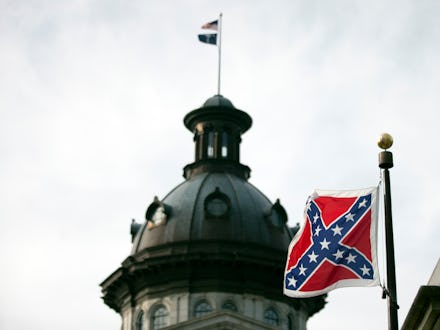The Fight Against the Confederate Flag Is Over — But the Fight for Equality Continues

After more than 13 hours of heated debate, South Carolina's House of Representatives voted to remove the Confederate flag from its Capitol grounds early Thursday morning. Gov. Nikki Haley is set to sign the bill into law on Friday morning, after which the flag will be lowered and sent off to a museum. The event represents a clear triumph for the progressive advocates who coalesced around taking down the flag in the wake of the Charleston massacre. In the very same instance, it illustrates just how much work remains for a country reeling from an epidemic of violence against its black communities.
Of course, South Carolina's decision to move the Confederate battle flag from a place of governance to a place for documenting its history is remarkable. The Confederate flag is a plain symbol of white supremacy, a fact that lies at the heart of why, until at least February of this year, most of the state's white population supported flying a Confederate flag on Capitol grounds, while most its black members did not:
The Confederate flag — which, unlike other flags by South Carolina's Statehouse, remained at full mast after a white supremacist hoping to launch a race war murdered nine African-Americans — was an affront to a society that claims that its history of racial domination was wrong. Not because it was culturally insensitive, but because it spoke to an inability to reckon with the full meaning of the past. As the Atlantic's Ta-Nehisi Coates writes, "The Confederate flag should not come down because it is offensive to African-Americans. The Confederate flag should come down because it is embarrassing to all Americans." The Confederate flag has no place being glorified in a country that claims to hold equality as one of its cornerstone principles. The prospect of it now fading from other states in the South as well bodes well for that ideal.
At the same time, it is important to remember that, by definition, this victory was entirely symbolic. South Carolina's former affection for the Confederate flag may have been the most flagrant reminder of its troubled history on race, but it was by no means its most harmful one. As Mic's Darnell Moore has reported, black South Carolinians makes up less than a third of the state's population but almost two-thirds of its prison population. Childhood poverty for black South Carolinians is three times greater than for white South Carolinians. The state is also home to voter ID laws that have been employed cynically by Republican legislatures nationwide to discourage and disenfranchise minority voters who face disproportionate hurtles in acquiring an ID. And it's one of many states that have been part of an increasingly conspicuous trend of police killing unarmed black men.
To really grapple with the limitations of celebrating the removal of South Carolina's Confederate flag, it may be best to reflect on the circumstances in which it arose. As Columbia University's Eric Foner explained in a recent interview, "The Confederate flag was only put up on top of the Statehouse in South Carolina in 1962. It was put there as a rebuke to the civil rights movement. It was not a long-standing commemoration of Southern heritage. It was a purely political act to show black people in South Carolina who was in charge."
It's useful to also remember the concrete policy changes that were happening around the time of the civil rights era to ensure that black Americans knew "who was in charge." Among these were a collusion between the state and the real estate industry to segregate American cities and the early shifts in rhetoric and policy on black crime that set the ground for modern-day mass incarceration. The institutional framework of the country's cities were engineered to produce starkly different outcomes for white Americans and black Americans, and they were successful — today, white households have 13 times the net wealth of black households.
In other words, addressing the root causes of racial prejudice requires us to look beyond symbolism and delve into its material dimensions. On Wednesday, the Obama administration announced a hugely important initiative that will require cities across the country to track how segregated their communities are and develop programs to make them more integrated and economically inclusive. It's a policy that won't generate the kind of attention that a colorful flag does, but it's likely to do more in the long run to help end the kind of social ills that the Charleston massacre brought to light. As the country carries on with a spirited conversation about what racial justice looks like in the U.S., we would do well to focus on the policies that will change people's lives the most.